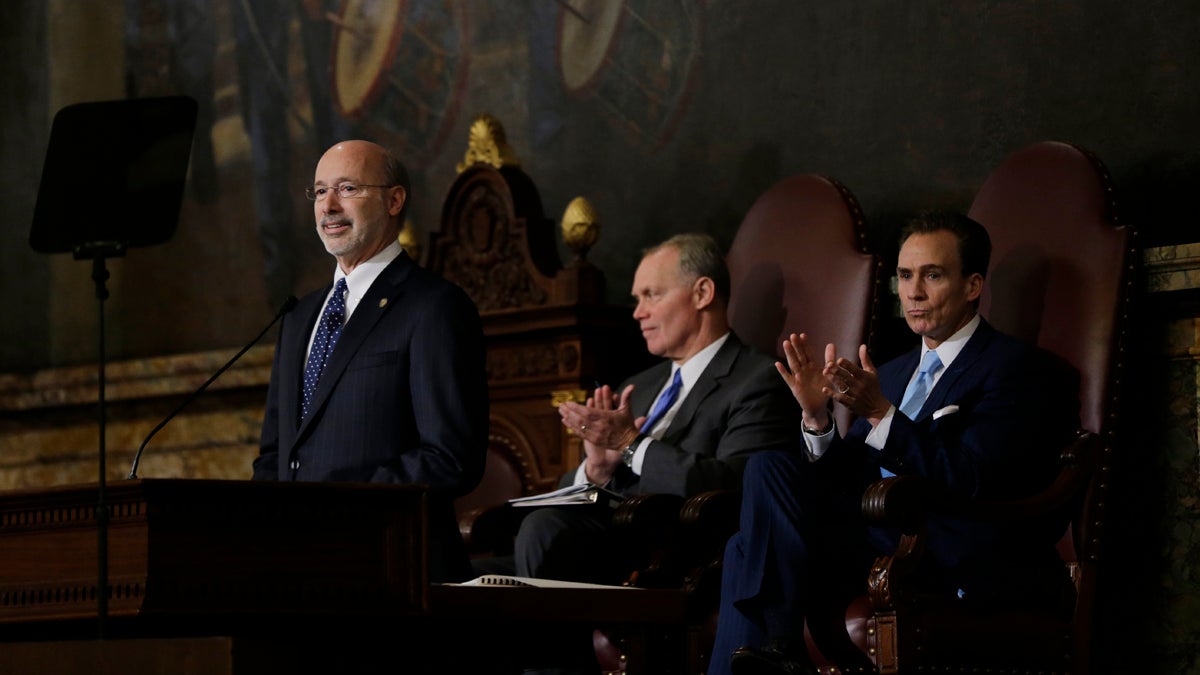Wolf’s first budget proposal could boost support for recovery, development in cities
Listen
Gov. Tom Wolf, left, delivers his budget address for the 2015-16 fiscal year to a joint session of the Pennsylvania House and Senate on Tuesday, March 3, 2015, in Harrisburg, Pa. Speaker of the House of Representatives, Rep. Mike Turzai, R-Allegheny, is at center, and Lt. Gov. Michael Stack, is at right. (AP Photo/Matt Rourke)
Gov. Wolf mentioned the need for municipal pension reform during his first budget address.
That was it. No details. And nothing else was said about cities – at least not explicitly.
But looking closely at the numbers and some other initiatives shows Wolf’s plan could benefit muinicipalities.
If you’re analyzing the Democrat’s first proposed budget for potential local impact, there are few things you couldn’t discount.
As Wolf’s fellow Democrat Lancaster Mayor Rick Gray put it: “the whole budget address was a commitment to municipalities.”
So let’s focus on the most direct and immediate potential impact on municipalities. The state Department of Community and Economic Development would get a $78 million boost from the general fund under Wolf’s spending plan. DCED’s earmark still would be less than half of what it was before the recession, which was more than $600 million. But it’s a dramatic boost for DCED compared to more recent years. Only the multibillion-dollar departments of Corrections and Education are slated to receive bigger general fund increases.
And the increase suggested for DCED is equivalent to 38 percent of its budget – only the Department of Conservation & Natural Resources’ 136 percent is steeper.
That surprised Pennsylvania Municipal League Executive Director Rick Schuettler. “Department of Community and Economic Development – it isn’t as sexy as other things. To us it can be very meaningful, though,” Schuettler said.
DCED might not be “sexy,” but the agency runs development programs meant to create jobs and boost the economy. It would oversee the industrial resource center manufacturing initiative, which would have $12 million to entice universities to focus research on manufacturing, for example.
DCED also administers Pennsylvania’s Act 47 municipal distress intervention program. New rules enacted last year set a five-year recovery timeline for Act 47 communities versus the open-ended process of the past. So, DCED might need more manpower as a result. But Wolf’s plan keeps funding for communities in the Act 47 process flat.
The budget proposal instead adds $1 million to the Early Intervention Program for cities that are at-risk for a fiscal crisis – but not quite there yet. The cities of York and Easton are examples.
“An increase in the Early Intervention Program is probably a good thing because more and more communities are going to have to access it,” Schuettler said.
Gray also pointed to education funding increases that could cut property taxes. To get the benefit, school districts must spend their rainy day funds until the amount is down to no more than 4 percent of their budgets, Budget secretary Randy Albright says. Some districts keep far more on hand – but they won’t even qualify for the funding, which will be allocated according to criteria including district size and poverty level, Albright says.
Wolf also proposes increasing aid to municipalities and their authorities to address deteriorating water and sewage treatment systems expected to total as much as $30 billion in the coming decades.
Planned Act 89 funding for transportation projects, expected to total more than $500 million through 2017, also will continue.
And Wolf’s budget adds $11 million to available DCED infrastructure and facility improvement grants.
In addition to shoring up critical infrastructure, those projects will create jobs.
Wolf also proposes adding four classes of state trooper cadets to bring the total complement to its highest number since before the recession. Some smaller municipalities have opted for State Police coverage instead of paying in full for a local force, merging theirs into a consolidated regional one (which might not save money, after all). Wolf’s spokesman Jeff Sheridan did not respond to questions about what’s motivating the increase (i.e., whether there are anticipated increases in the small-town opt-ins, or unmet current needs) and whether there’s potential to initiate fees for service.
The Auditor General’s office, which monitors municipal pensions, would get $6 million already planned as part of a multiphase technology improvement project meant to digitize and streamline what’s still a document-heavy system.
WHYY is your source for fact-based, in-depth journalism and information. As a nonprofit organization, we rely on financial support from readers like you. Please give today.



